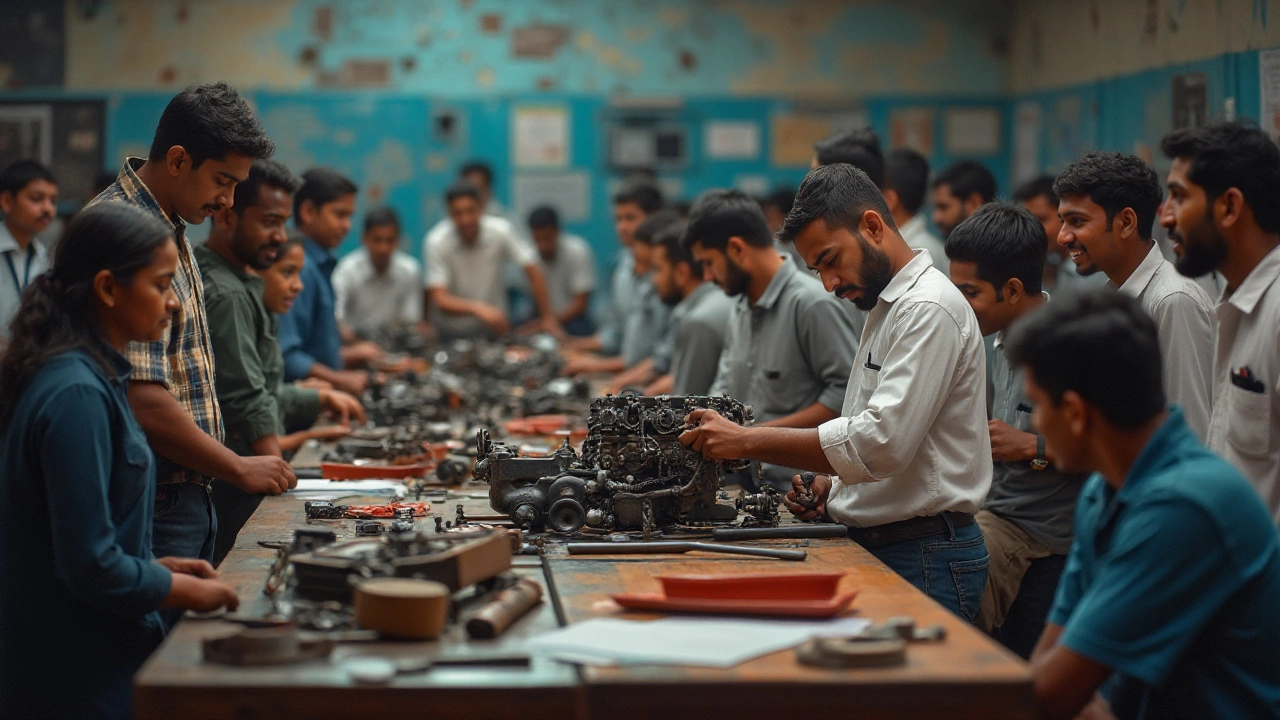Vocational Courses – Real Skills for Real Jobs
If you’re tired of sitting through endless lectures and want to actually do something useful, vocational courses might be the answer. These programs focus on hands‑on learning, so you walk away with a skill you can use the next day. Whether you’re fresh out of high school or looking to switch careers, the right vocational course can put you on a fast track to employment.
One big advantage is speed. Most courses finish in a few months to two years, compared with the three‑plus years a typical degree needs. That means you start earning sooner and avoid the mountain of student debt that comes with a four‑year program. Plus, employers love candidates who can hit the ground running because they’ve already practiced the job in a real‑world setting.
Why Choose Vocational Courses?
First off, they’re built around industry demand. Trade schools and technical institutes work closely with companies, so the curriculum matches what employers actually need. This alignment means higher placement rates and better starting salaries. For example, a recent survey showed that 78 % of graduates from accredited vocational programs landed a job within three months of finishing.
Second, you get a clear path to certification. Many vocational courses end with a recognized credential—think electrician licenses, culinary diplomas, or nursing assistants’ certificates. These credentials are often required by law or preferred by hiring managers, giving you a leg up on the competition.
Lastly, the learning environment is practical. Instead of sitting in a lecture hall, you spend time in workshops, labs, or on‑site placements. That hands‑on approach sticks better in memory and builds confidence. If you learn by doing, you’ll find vocational training far more engaging than textbook‑heavy college classes.
Top High‑Pay Vocational Paths in 2025
When money matters, certain trades stand out. According to the latest job market data, these five vocational courses lead the pack for salary:
- Electrical Installation & Maintenance – Skilled electricians now earn upwards of ₹8‑10 lakhs per year, and demand is projected to grow with the push for renewable energy.
- Digital Networking & Cybersecurity – A short‑term certification in network security can fetch ₹7‑9 lakhs, thanks to the boom in cloud services.
- Advanced CNC Machining – CNC operators earn close to ₹6‑8 lakhs, especially in manufacturing hubs that need precision parts.
- Healthcare Support (Nursing Assistant, Medical Lab Tech) – With India’s expanding health sector, these roles pay ₹5‑7 lakhs and offer quick job placement.
- Culinary Arts – Specialty Kitchens – Top chefs in boutique restaurants or hotel chains can start at ₹5‑6 lakhs, and the ceiling climbs fast with experience.
Choosing any of these routes means you’re aligning your education with sectors that are hiring now and will continue to grow.
Of course, vocational training isn’t a one‑size‑fits‑all solution. Some students thrive in a college environment that includes research, theory, and broader networking. That’s why we also compare college vs. vocational training, so you can see which fits your goals.
College offers a wider academic base, which can be useful if you aim for leadership roles that require a degree. However, the cost and time investment are higher, and the payoff can be slower if you end up in a field where practical skills matter more than a diploma.
In short, if you want a clear, fast, and affordable route to a stable job, vocational courses are worth serious thought. They give you concrete skills, recognized certifications, and a direct line to employers who need you right now.
Ready to explore a specific course? Browse our list of articles—like “Vocational Courses With the Highest Salary” or “College vs Vocational Training: Key Differences Explained”—to find the exact program that matches your interests and salary goals.
What Is the Highest Paid Vocational Career in 2025?
The highest paid vocational career in 2025 is powerline technician, earning up to $140,000 annually. Learn about top-paying trade jobs, training paths, and why skilled trades now outearn many university degrees.
read moreVocational Courses With the Highest Salary: What's Worth Your Time?
Curious about which vocational course leads to the fattest paycheck? This article breaks down the real earning potential of top hands-on careers, without any fluff. Get the facts about which trades are topping the charts in 2025 and where you'll find the best return on your investment. Find out what makes these paths so lucrative and get some tips on how to make the smartest choice for your future. Looking to skip the four-year degree debt and still earn big? You’re in the right place.
read moreCollege vs Vocational Training: Key Differences Explained
Choosing between college and vocational training isn't as simple as picking where to hang out for the next few years. This article breaks down how college and vocational programs really work, what each means for your wallet, and who thrives in these different settings. You'll also find some cool facts about graduation rates, earning power, and even shortcuts to getting a job. If you're figuring out your next step after high school, this guide lays it all out, plain and simple.
read moreVocational Training: What Is It and Who Needs It?
Vocational training is all about equipping individuals with specific skills for particular trades or careers. It focuses on practical, hands-on experience and prepares learners for direct entry into specific professions. From electricians to healthcare aides, vocational courses cover a broad range of careers and are essential for many industries. These courses often offer quicker paths to employment and are a great fit for people who prefer learning by doing. In this article, we'll explore what vocational training entails and why it might be the right choice for you.
read moreVocational School: What Else Is It Called?
Vocational schools are brimming with opportunities but often go by different names. Whether referred to as trade schools, technical institutes, or career colleges, they all focus on providing practical skills for specific careers. This article delves into these alternatives and offers insights on choosing the right path. From automotive repair to culinary arts, vocational programs are diverse and catered to getting you job-ready fast.
read moreUnderstanding Vocational Training: Key Examples and Insights
Vocational training equips individuals with specialized skills for specific careers or trades. Unlike traditional academic pathways, vocational programs focus on hands-on experience and practical knowledge immediately applicable to various industries. Popular examples include certifications in nursing, culinary arts, automotive repair, and technology sectors. By providing a direct path to employment, vocational training addresses skills shortages and enhances employability in today's dynamic job market. It is an essential educational alternative fostering both personal growth and economic advancement.
read moreUnderstanding Vocational Education in Schools
Vocational education in schools focuses on practical skill development, preparing students for specific trades or careers. Unlike traditional academic paths, these programs integrate hands-on experience with classroom learning, offering students a pathway to employability in fields like carpentry, culinary arts, or technology. With the growing demand for skilled tradespeople, vocational courses are becoming increasingly important in bridging the gap between education and the workforce. By providing real-world applications and job-ready skills, vocational education plays a vital role in modern schooling.
read moreUnderstanding Vocational Qualifications: Your Guide to Career-Specific Skills
Vocational qualifications are designed to equip individuals with the practical skills and knowledge required for specific careers. Unlike academic courses, vocational training focuses on hands-on experience and industry-specific competencies. They're a great option for those who prefer practical learning and wish to enter the workforce quickly. These programs often lead to recognized certifications, making them invaluable for career progression. Understanding the structure and benefits of vocational qualifications can help you make informed career decisions.
read more






